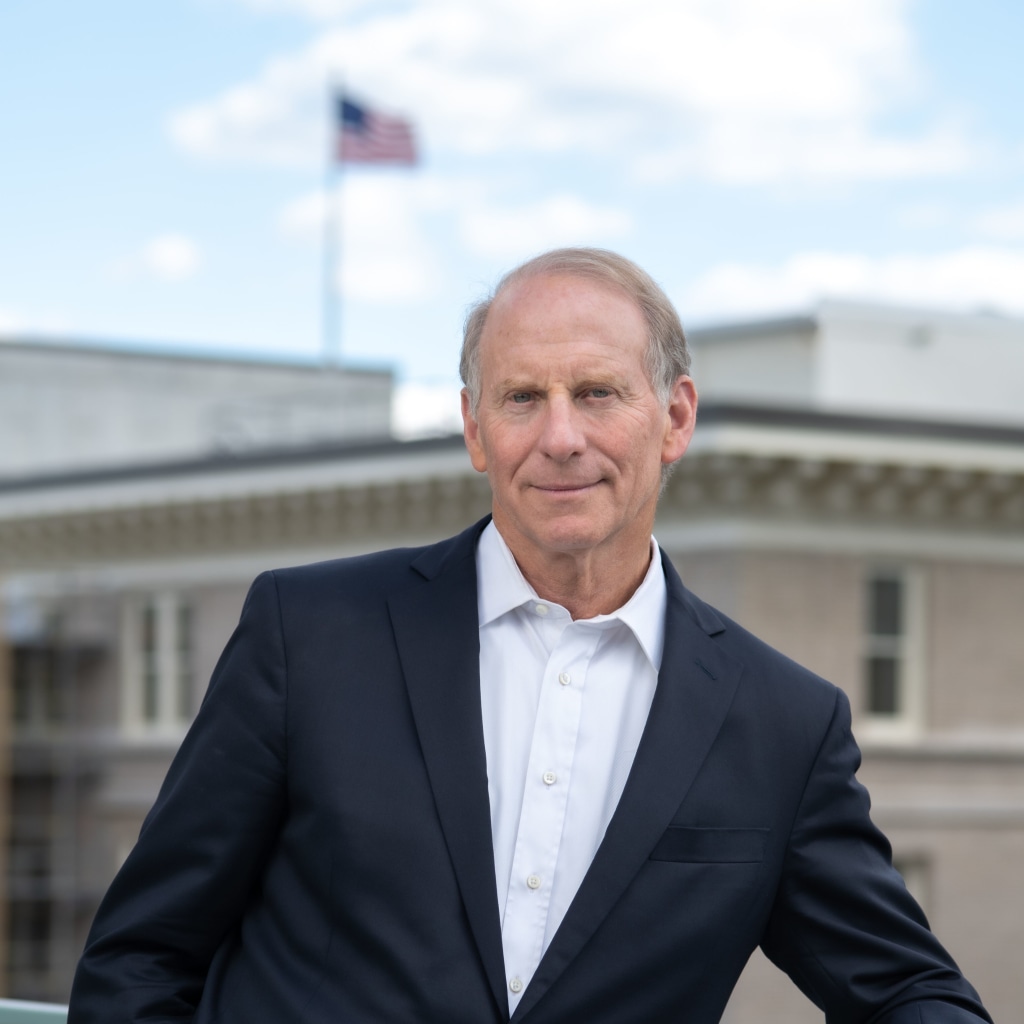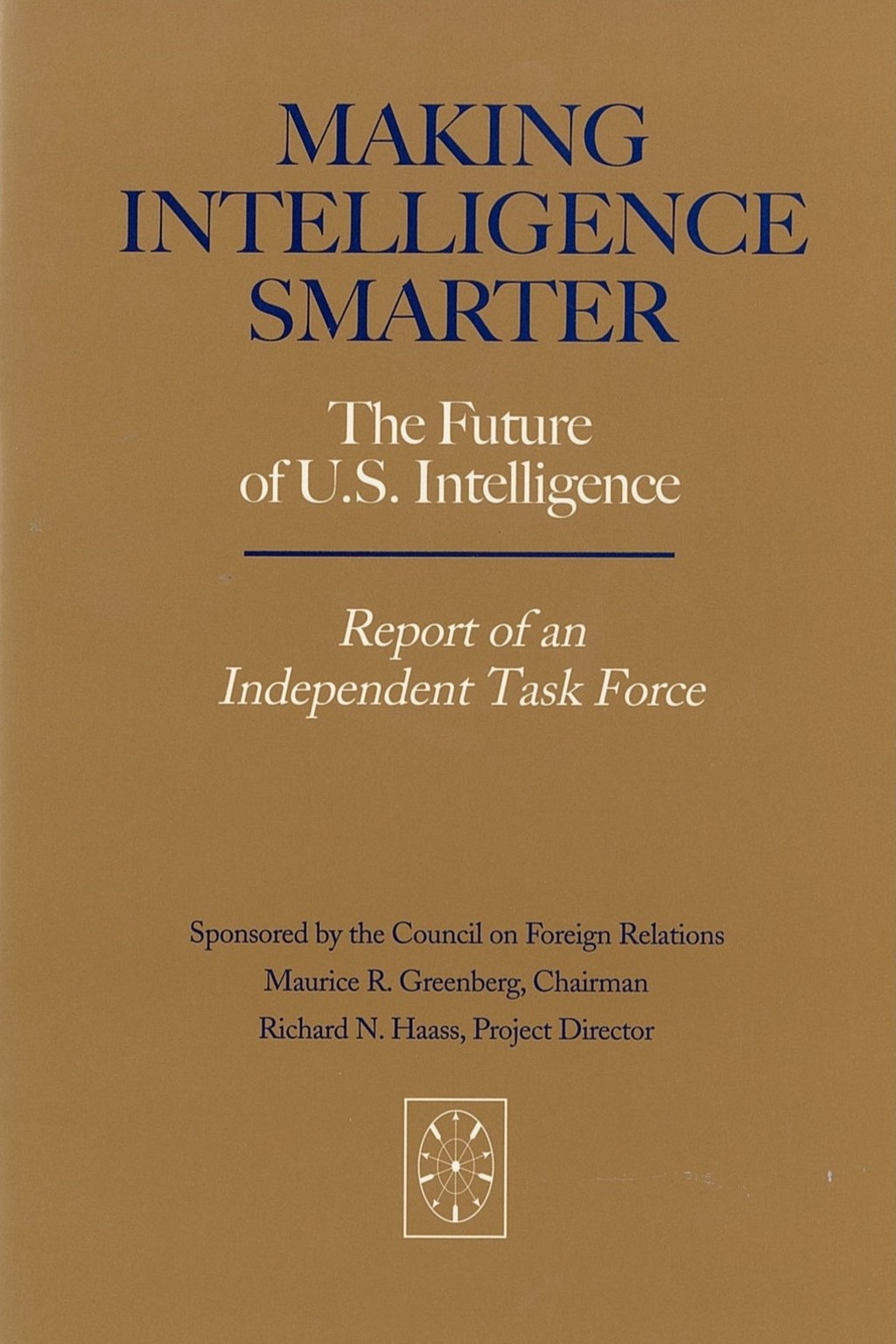Task Force Report No. #7
Making Intelligence Smarter
![]() Richard HaassCochair
Richard HaassCochair
What are Task Force Reports?
CFR sponsors Task Forces to assess issues of critical importance to U.S. foreign policy to reach bipartisan consensus on policy recommendations.
Who makes them?
Task Force members aim to reach a meaningful consensus on policy and are solely responsible for the content of their report.
The need for intelligence, and for a capability within the U.S. government to collect, produce, and disseminate it, remains critical. The end of the Cold War will not usher in an age of peace and security. Nor is the need for intelligence eliminated by new sources of open information. There are still important but hard to learn facts about targets---the intentions and capabilities or rogue states and terrorists, the proliferation of unconventional weapons, the disposition of potentially hostile military forces---that can only be identified, monitored, and measured through dedicated intelligence assets. The United States will have to continue to devote significant resources to intelligence if it wants an enhanced capability. The money will be well spent if it improves the effectiveness of diplomatic and military undertakings. Good intelligence cannot guarentee good policy, but poor intelligence frequently contributes to policy failure.
This is a principal finding of a report of a Task Force of former government officials, military officers, businessmen, and scholars. This report offers judgments and makes recommendations on some of the most important questions affecting the future of U.S. national security: priorities for intelligence collection, the role of economic intelligence, improving analysis and increasing its impact, the future of clandestine activities, reorganizing the intelligence community, intelligence ties with both the military and law enforcement, and congressional and public oversight.
Task Force Members
Task Force Members:
MORTON I. ABRAMOWITZ: Mr. Abramowitz is President of the Carnegie Endowment for International Peace. He was Ambassador to Turkey and served as Assistant Secretary of State for Intelligence and Research.
RICHARD K. BETTS: Mr. Betts is Professor of Political Science and Director of the International Security Policy Program in the School of International and Public Affairs at Columbia University.
PAUL BRACKEN: Mr. Bracken is Professor of Management and of Political Science at Yale University. He also serves on the Chief of Naval Operations Executive Panel and on the Army Science Board.
CHESTER A. CROCKER: Mr. Crocker is Research Professor of Diplomacy at Georgetown University. He also serves as Chairman of the Board of the United States Institute of Peace and was formerly Assistant Secretary of State for African Affairs.
JAMES H. EVANS: Mr. Evans is former Chairman and CEO of Union Pacific Corporation. He has also served as President and a Director of Union Pacific and as President and Chairman of the Seamens Bank for Saving.
LESLIE H. GELB: Mr. Gelb is President of the Council on Foreign Relations. He was a foreign affairs columnist and Editor of the Op-Ed page for The New York Times. He also served as Director of the State Departments Bureau of Politico-Military Affairs.
PAUL E. GRAY: Mr. Gray is Chairman of the Corporation for Massachusetts Institute of Technology. Previously, he served as MITs President and as Chancellor of the Institute.
MAURICE R. GREENBERG: Mr. Greenberg is Chairman and CEO of American International Group, Inc.
HENRY A. GRUNWALD: Mr. Grunwald is former Editor-in-Chief of Time, Inc.
RICHARD N. HAASS: Mr. Haass is Director of National Security Programs and Senior Fellow at the Council on Foreign Relations. He served as Special Assistant to President George Bush and Senior Director for Near East and South Asian Affairs of the National Security Council.
WILLIAM HOOD: Mr. Hood is a former Executive Officer of the Counterintelligence Staff of the CIA.
CORDELL HULL: Mr. Hull is Executive Vice Chairman of Bechtel Enterprises, Inc.
RICHARD KERR: Mr. Kerr is former Deputy Director of the CIA and Deputy Director of Central Intelligence. He also served as Acting Director of Central Intelligence.
JOSHUA LEDERBERG: Mr. Lederberg is University Professor and President Emeritus as well as Sackler Foundation Scholar at The Rockefeller University.
JESSICA T. MATHEWS: Ms. Mathews is Senior Fellow at the Council on Foreign Relations and a columnist for The Washington Post. She served as Deputy to the Under Secretary of State for Global Affairs and was Vice President of the World Resources Institute.
MERRILL A. MCPEAK*: General McPeak (U.S. Air Force, retired) is President of McPeak and Associates. He was formerly Chief of Staff of the U.S. Air Force.
LIONEL OLMER: Mr. Olmer is a partner in the law firm of Paul, Weiss, Rifkind, Wharton & Garrison. He was formerly Under Secretary of Commerce for International Trade.
EDWIN J. PECHOUS: Mr. Pechous is an independent consultant and recently retired senior U.S. government official who spent much of his career with the CIA.
JAMES D. ROBINSON III: Mr. Robinson is President of J. D. Robinson, Inc. He was formerly Chairman and CEO of American Express.
BRENT SCOWCROFT: General Scowcroft (U.S. Air Force, retired) is President of the Forum for International Policy and the Scowcroft Group. He was National Security Adviser for Presidents George Bush and Gerald Ford.
ANGELA E. STENT: Ms. Stent is Professor of Government at Georgetown University.
GORDON RUSSELL SULLIVAN: General Sullivan (U.S. Army, retired) is Corporate Vice President of Coleman Research Corporation. He was formerly Chief of Staff of the U.S. Army.
ROBERT C. WAGGONER: Mr. Waggoner is President of Burrelles Information Services. He is also Chairman of Video Monitoring Services of America, Inc.
JOHN L. WEINBERG: Mr. Weinberg is Senior Chairman of Goldman Sachs & Company.
FRANK G. ZARB: Mr. Zarb is President and CEO of Alexander and Alexander Services, Inc. He has served as Vice Chairman and Group Chief Executive of the Travelers Inc. and as Chairman and CEO of Smith Barney.
Observers
CHARLES BATTAGLIA: Mr. Battaglia is Majority Staff Director for the Senate Select Committee on Intelligence. He worked for the CIA in the early 1980s.
MARK LOWENTHAL: Mr. Lowenthal is Staff Director for the House Permanent Select Committee on Intelligence. He has served as a senior analyst at the Congressional Research Service and in the State Departments Bureau of Intelligence and Research.
BRITT SNIDER: Mr. Snider is Staff Director of the Commission on the Roles and Capabilities of the United States Intelligence Community.







